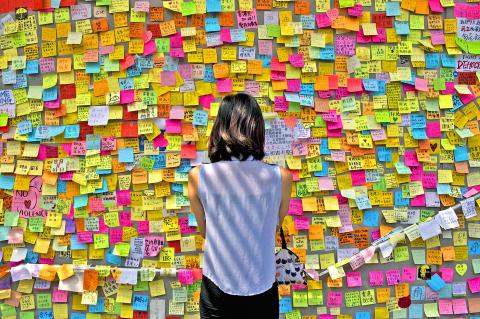Small groups of pro-democracy demonstrators remained on Hong Kong’s streets yesterday, after protest leaders agreed to talks with the government and some students returned to school for exams.
Talks between the government and student leaders are progressing at a snail’s pace, although even protest leaders are now acutely worried that further disruption could alienate supporters.
The mass protests for fully free elections have brought parts of the territory to a standstill for more than a week and while many remain supportive of the movement, they also want to resume their daily lives.

Photo: Reuters
A second round of “preparatory talks” was held late on Monday night in a bid to set conditions for formal negotiations. Students had already agreed to talks with Hong Kong Chief Secretary Carrie Lam (林鄭月娥), but called them off on Friday after what they described as “organized attacks” on protesters at the Mong Kok demonstration site.
Yet a Hong Kong delegate to China’s National People’s Congress said the protests could not overturn Beijing’s August decision to vet candidates for the territory’s 2017 leadership elections.
“I don’t see why the National People’s Congress Standing Committee would change its decision... It was a nationwide decision and the decision has to face the country’s 1.3 billion people,” Rita Fan (范徐麗泰) told reporters.
Yesterday was another day of traffic mayhem, with diversions causing jams and commuter frustration, and the reopening of primary schools adding to the chaos.
The few protesters that remain are still determined to make their point, though unsure of the result.
“To be honest, I don’t have confidence that we can succeed, but whether we succeed or not, I am giving my best. I also learned that we can speak out when it is needed,” said Dickson Yeung, 20.
Demonstrator numbers grew throughout the day, but remained low at protest sites as well as outside the central government offices. Yet despite dwindling crowds, today’s opening of the Legislative Council was postponed to next week.
“I am not assured that there is a quiet and safe environment in the surroundings for a meeting to be held,” Legislative Council President Jasper Tsang (曾鈺成) said.
Pro-democracy lawmakers slammed the cancelation.
“You can’t dodge it forever. Even if you postpone it for three weeks, public anger will not go away,” Civic Party leader Alan Leong (梁家傑) told reporters.

INVESTIGATION: The case is the latest instance of a DPP figure being implicated in an espionage network accused of allegedly leaking information to Chinese intelligence Democratic Progressive Party (DPP) member Ho Jen-chieh (何仁傑) was detained and held incommunicado yesterday on suspicion of spying for China during his tenure as assistant to then-minister of foreign affairs Joseph Wu (吳釗燮). The Taipei District Prosecutors’ Office said Ho was implicated during its investigation into alleged spying activities by former Presidential Office consultant Wu Shang-yu (吳尚雨). Prosecutors said there is reason to believe Ho breached the National Security Act (國家安全法) by leaking classified Ministry of Foreign Affairs information to Chinese intelligence. Following interrogation, prosecutors petitioned the Taipei District Court to detain Ho, citing concerns over potential collusion or tampering of evidence. The

TRADE: The premier pledged safeguards on ‘Made in Taiwan’ labeling, anti-dumping measures and stricter export controls to strengthen its position in trade talks Products labeled “made in Taiwan” must be genuinely made in Taiwan, Premier Cho Jung-tai (卓榮泰) said yesterday, vowing to enforce strict safeguards against “origin laundering” and initiate anti-dumping investigations to prevent China dumping its products in Taiwan. Cho made the remarks in a discussion session with representatives from industries in Kaohsiung. In response to the US government’s recent announcement of “reciprocal” tariffs on its trading partners, President William Lai (賴清德) and Cho last week began a series of consultations with industry leaders nationwide to gather feedback and address concerns. Taiwanese and US officials held a videoconference on Friday evening to discuss the

NEGOTIATIONS: The US response to the countermeasures and plans Taiwan presented has been positive, including boosting procurement and investment, the president said Taiwan is included in the first group for trade negotiations with the US, President William Lai (賴清德) said yesterday, as he seeks to shield Taiwanese exporters from a 32 percent tariff. In Washington, US Trade Representative Jamieson Greer said in an interview on Fox News on Thursday that he would speak to his Taiwanese and Israeli counterparts yesterday about tariffs after holding a long discussion with the Vietnamese earlier. US President Donald Trump on Wednesday postponed punishing levies on multiple trade partners, including Taiwan, for three months after trillions of US dollars were wiped off global markets. He has maintained a 10 percent

PERSONAL DATA: The implicated KMT members allegedly compiled their petitions by copying names from party lists without the consent of the people concerned Judicial authorities searched six locations yesterday and questioned six people, including one elderly Chinese Nationalist Party (KMT) member and five KMT Youth League associates, about alleged signature forgery and fraud relating to their recall efforts against two Democratic Progressive Party (DPP) legislators. After launching a probe into alleged signature forgery and related fraud in the KMT’s recall effort, prosecutors received a number of complaints, including about one petition that had 1,748 signatures of voters whose family members said they had already passed away, and also voters who said they did not approve the use of their name, Taipei Deputy Chief Prosecutor